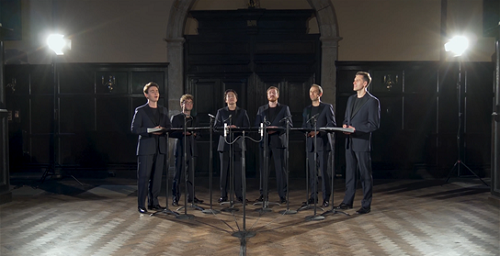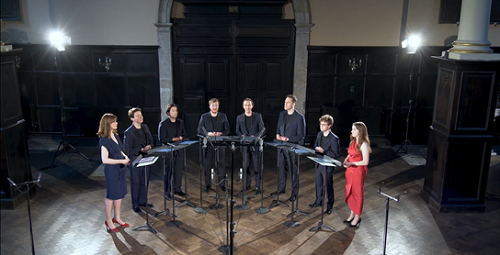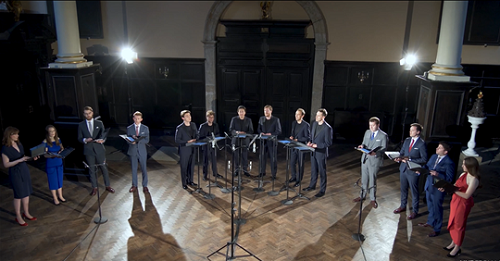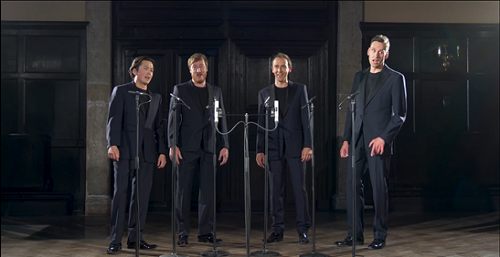The King’s Singers’ Live from London Summer programme was titled, optimistically, A New Day, reflecting the series’ theme of renewal and regeneration, and drawing together music ‘with a focus on sunrise, moonlight, the passing of time and the cycle of day and night in all its natural beauty’.
‘Days’ by Bob Chilcott – a former tenor in The King’s Singers and now a well-known composer of choral music – opened the programme. This short four-part song is part of a set, Even Such is Time, which was written for The King’s Singers and the Girl Choristers of Salisbury Cathedral, and first performed in 1993. Countertenor Patrick Dunachie’s bright, pure question, “What are days for?” invited the other five singers to reflect upon Philip Larkin’s superficially simple answer to the mystery of life, the two upper voices bobbing and weaving, almost surfing a wave – “Days are where we live … They are to be happy in: Where can we live but days?” – with Jonathan Howard’s light bass line keeping the fleet dancing grounded. But, Larkin ‘turns’ his brief poem in the second stanza with the word ‘Ah’, which was solemnly interjected by the four lower voices, introducing images of the priest and doctor running “over the fields” in “their long coats”, and issuing a challenge to the cheerful repetitions. The final cadence resolves cluster to consonance – perhaps not quite capturing Larkin’s characteristic and ambiguous balancing of the comic and the morbid – but jubilant and uplifting of spirit nevertheless.

For the song which gives Even Such is Time its title, The King’s Singers were joined by VOCES8’s sopranos, Andrea Haines and Molly Noon. ‘Even such is time’ concludes the set and is a setting of the prayer said to have been written by Sir Walter Raleigh on the eve of his execution in Old Palace Yard, Westminster on 29th October 1618. Chilcott’s initial overlapping phrases, here soft and sweet, seem a little at odds with the bitterness of the resignation that Time “takes in trust Our youth, our joys, our all we have, And pays us but with age and dust”, but the subsequent homophonic acknowledgement – for male voices alone, unisons expanding into gentle dissonances – that the closure of “the story of our days” cannot be resisted, evoked the quiet simplicity of a carol. The final two lines of Raleigh’s poem bring a change of tone, and the declaration that “from this earth, this grave, this dust,/ My God shall raise me up, I trust” conjured renewed faith and optimism. True resolution, though, came only with the entry of the two sopranos’ soaring, ecstatic descant, angels of redemption above the men’s firm ostinatos below.

Chilcott’s ‘High Flight’ was composed in 2008 for The King’s Singers’ 40th anniversary. It, too, sets a seventeenth-century text: the first stanza of Henry Vaughan’s ‘The World’, with its representation of Eternity as a ‘great ring of pure and endless light’, with no beginning or end, contrasting in its permanence and sheer vastness with the dark sinfulness of man’s everyday life. However, Chilcott follows Vaughan’s agitated metaphysical reflections with the view of eternity glimpsed from the cockpit of a spitfire airplane, as described by the Anglo-American aviator and poet John Gillespie Magee who died in a mid-air collision over Lincolnshire in 1941. In Magee’s sonnet, man slips ‘the surly bonds of Earth’, flying higher even than the larks or eagles, transcending the boundaries of the natural world.
Framed by two VOCES8 ‘quartets’, The King’s Singers communicated the intensity of Vaughan’s vision, the hovering waves and flickers of VOCES8’s surrounding sound-field capturing the immense sweep of eternity – thus conveying Vaughan’s Dantesque contrast of two worlds: of man’s dark shadows and of ‘pure and endless light’. Then, suddenly, we were flying, as the nimble, excited motifs of the six male voices “danced the skies on laughter-silvered wings … and joined the tumbling mirth Of sun-split clouds”, exploding in an ecstatic ascent, “Up, up the long, delirious burning blue”. Strangely, Chilcott’s setting does not retain the formal volta of the sonnet, but the entry of VOCES8 with the poet-pilot’s surmounting of the “wind-swept heights” was no less thrilling, raising us not just above the natural world but into the supernatural “high untrespassed sanctity of space”, recalling Vaughan’s divine ring. The ‘quasi-delirious’ fourteen voices strove ever higher and louder, creating a rapturous blaze of sound as man almost becomes a god: “Put out my hand, and touched the face of God.”

Another interesting juxtaposition was offered by pairs of madrigals drawn from Il Trionfi di Dori – a book of 29 six-voice madrigals, each by a different poet and composer, which was commissioned by a Venetian nobleman Leonardo Sanudo (1544-1607) and published in the city in 1592 – and The Triumphs of Orianna, a set of 25 English madrigals in five and six voices by Morley, Weelkes, and 21 others, in praise of Elizabeth I, which was inspired by the Italian set and published by Morley in 1601. These collections serve as a sort of musical ‘who’s who’ of the day and include works by some whose names are familiar to us today, and others who remain almost unknown.
One of the former is Alessandro Striggio, whose ‘Eran ninfe e pastori’ is full of bucolic charm. The six voices blended beautifully in the opening phrases with their elegant imagery of “nymphs and shepherds,/ United with the graces and the gods of love”. A gentle hush and lightening of the texture, as these pastoral dwellers wove garlands from “roses, acanthus, and amaranth”, anticipated the spirited closing praise in honour of ‘Dori’ – the nickname of Sanudo’s wife, Elisabetta – in the final line, a tribute repeated in each madrigal: “Viva la bella Dori” (Long live beautiful Dori). The same flawless intonation and ensemble characterised the tender sobriety of Giovanni Cavaccio’s ‘Giunta qui Dori, e pastorelli amanti’. After travels in Bavaria, Rome and Venice, Cavaccio spent most of his working life in his native Bergamo where he was maestro di cappella of the Cathedral (1581-98) and then at Santa Maria Maggiore until his death in 1626. The inclusion of ‘Giunta qui Dori, e pastorelli amanti’ in Il Trionfo di Dori suggests that his renown spread beyond his hometown, and The King’s Singers’ carefully graded dynamics, sensitivity to the text, and prevailing urbanity conveyed the madrigal’s combination of reverence and sunny happiness.
Michael Cavendish’s ‘Come, gentle swains’ would have left Elizabeth I in no doubt of the devotion of her subjects. Here, the composer’s extended refrain, ‘Long live fair Oriana’, was wonderfully smooth and refreshing. Baritone Nick Ashby joined Jonathan Howard at the bottom of the five-part texture, deepening the sincerity of the praise as the calm warmth of the overlapping repetitions suggested the gratitude of the whole nation to the Queen who unites them. In contrast, in ‘All Creatures now are merry minded’ John Bennet relishes the opportunity to indulge in pictorial madrigalisms and The King’s Singers skipped lightly through the tripping repetitions and nonchalant “fa la la-ing”, “winded” their bugles resoundingly and spun elated as birds which “over her do hover” – such merry playfulness making the flowering of the luxurious refrain all the more majestic.

The King’s Singers also marked this year’s centenary of the death of Camille Saint-Saëns. ‘Calme des nuits’, published in 1883 as part of a pair of choruses, is a stirring but mysterious hymn to the night, and the handsome textures, carefully crafted by The King’s Singers, were wonderfully cleansing after the ecstatic peaks of ‘High Flight’. The ensemble produced beautifully sustained lines, welding together the overlapping, accumulating voices, and effected an uplifting shift of gear with the emotive vision of “L’éclat du soleil”, as if light was made sound. The quietude of the close was deepened by the slightest detachment of the final word, “Le poète seul est hanté/ Par l’amour des choses tranquilles.” (Only the poet is possessed by the love of quiet things.) The title of ‘Saltarelle’, composed two years later, alludes to the popular fifteenth-century Italian dance, the saltarello, with its customary fast 6/8 rhythm, and Émile Deschamps’ poem, ‘Venez, enfants de la Romagne’, depicts the nocturnal pre-penitential carousing of a group of Romany gypsies on the eve of Lent. ‘Saltarelle’ is scored for TTBB and it was a pleasure to hear the lower voices in solo melodic roles, particularly in the passages in which tenor Julian Gregory and bass Jonathan Howard conducted a vibrant, dynamic exchange, propelled onwards by the soft, restless repetitions of tenor Christopher Bruerton and baritone Nick Ashby. This was lovely crisp, clean singing, an infectious appeal to “Quittez la plaine et la montagne/ Pour danser aux tambourins.” (Leave the plains and the mountains to dance to the beat of the tambourines!) The singers’ idiomatic French was particularly persuasive in the calmer central section in which a plea is made to the Virgin Mary to forgive the revellers’ excesses, but the sweet entreaties could not quell the merriment and the dancing, drinking and dalliances continued with unflagging stamina through the night!
Following the unblemished optimism of Peter Knight’s arrangement of John David’s ‘You are the new day’, with its seamlessly changing textures, the performance concluded with a sequence of beguiling ‘close harmony’ songs. Jacob Collier’s‘In the real early morning’ (as arranged by Patrick Dunachie) offered rich layerings and esoteric harmonies; ‘Kokomo’ by The Beach Boys (arr. Bob Chilcott) cheerfully sashayed its way down to the beach and showcased Ashby’s easy-listening charm. Supporting Gregory’s honeyed melody, the juicy timbres and harmonies of Harold Arlen’s ‘It’s a new world’ gave way to the Chris Bruerton’s ‘trombone intro’ to a relaxed rendition of The Beatle’s ‘When I’m sixty-four’, in which Bruerton proved a suave-toned soloist too, with Gregory slipping into the brass section to fill the gap.
The two ensembles came together to bring the ‘new day’ peacefully and consolingly to a close with Billy Joel’s ‘Lullaby (Goodnight, My Angel)’ as arranged by Philip Lawson and Nick Ashby.
Claire Seymour
The King’s Singers: Patrick Dunachie and Edward Button (countertenor), Julian Gregory (tenor), Christopher Bruerton and Nick Ashby (baritone), Jonathan Howard (bass)
VOCES8: Andrea Haines and Molly Noon (soprano), Katie Jeffries-Harris (alto), Barnaby Smith (artistic director/countertenor), Blake Morgan (tenor), Euan Williamson (tenor), Christopher Moore (baritone), Jonathan Pacey (bass)
A New Day: Bob Chilcott – ‘Days’ (from Even such is time); Alessandro Striggio – ‘Eran ninfe e pastori’ and Giovanni Cavaccio – ‘Giunta qui Dori, e pastorelli amanti’ (from Il Trionfo di Dori); Michael Cavendish – ‘Come, gentle swains’ and John Bennet – ‘All creatures now are merry-minded’ (from The Triumphs of Oriana); Bob Chilcott – ‘Even such is time’* (from Even such is time), ‘High Flight’**; Camille Saint-Saëns – ‘Calme des nuits’, ‘Saltarelle’; John David, arr. Peter Knight – ‘You are the new day’; Jacob Collier, arr. Patrick Dunachie – ‘In the real early morning’; The Beach Boys, arr. Bob Chilcott – ‘Kokomo’; Harold Arlen, arr. Richard Rodney Bennett – ‘It’s a new world’; The Beatles, arr. Paul Hart – ‘When I’m sixty-four’
* with VOCES8 sopranos
** with VOCES8
St Anne and St Agnes, VOCES8 Centre, City of London; Saturday 24th July 2021.